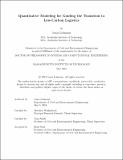Quantitative Modeling for Guiding the Transition to Low-Carbon Logistics
Author(s)
Lehmann, Jonas
DownloadThesis PDF (12.65Mb)
Advisor
Winkenbach, Matthias
Sheffi, Yossi
Terms of use
Metadata
Show full item recordAbstract
We propose quantitative models to guide the transition to low-carbon logistics by adopting new vehicle technologies. Freight and logistics systems are key enablers of global economic growth, competitiveness, and access to markets and services. However, freight mobility is a significant and growing source of negative externalities, including greenhouse gas emissions, thus facing increasing pressure to decarbonize. This thesis addresses the sector’s inherent decarbonization complexities, offering decision-support tools and insights across three chapters to decouple freight activity from carbon emissions.
First, we investigate the operational requirements for leveraging low-emission delivery vehicles in a last-mile distribution system. Specifically, we provide exact and heuristic solution approaches to route goods through a two-echelon multi-modal last-mile distribution system with satellite facilities. These systems can enhance flexibility and agility in serving densely populated, congested urban areas while reducing negative externalities by employing various vehicle types suitable for specific urban environments.
Second, we study the tactical and strategic implementation of vehicle fleet transitions towards low-carbon technologies under emissions reduction targets. More specifically, we provide a multi-period combinatorial optimization decision-support tool that offers cost-optimal fleet replacement and utilization decisions given a set of decarbonization targets. A case study utilizing fleet and network data from a large U.S. consumer goods company underscores the importance of strategic planning and execution in fleet transitions to leverage network-wide cost benefits and minimize potential excess costs as first movers.
Third, we investigate the roles of energy choices and cost uncertainties in fleet asset decarbonization. We propose a stochastic programming model to account for uncertainty in fixed and variable costs and the associated risk of stranded assets given the dynamic developments of low-emission technologies. We find that incorporating cost uncertainty captures a broader range of future technology pathways, and dynamically adjusting fleet transition strategies may offer advantages over static, deterministic approaches.
Date issued
2024-05Department
Massachusetts Institute of Technology. Department of Civil and Environmental EngineeringPublisher
Massachusetts Institute of Technology